Afghanistan: Taliban 'tortured and massacred' men from Hazara minority
 Getty Images
Getty ImagesThe Taliban recently "massacred" and brutally tortured several members of the Hazara minority in Afghanistan, says human rights group Amnesty International.
Witnesses have given harrowing accounts of the killings, which took place in early July in Ghazni province.
Since taking over the Afghan capital Kabul on Sunday, the Taliban have tried to portray a more restrained image.
But Amnesty said the incident was a "horrifying indicator" of Taliban rule.
The Hazara community is Afghanistan's third largest ethnic group.
They mainly practise Shia Islam and have faced long-term discrimination and persecution in predominantly Sunni Afghanistan and Pakistan.
In the report published on Thursday, Amnesty said the nine Hazara men were killed between 4 and 6 July in Malistan district in the eastern Ghazni province.
The rights group interviewed eyewitnesses and reviewed photographic evidence after the killings.
Villagers said they had escaped to the mountains when fighting intensified between government forces and Taliban fighters.
When some of them returned to the village of Mundarakht to collect food, they said the Taliban had looted their homes and were waiting for them. Separately, some men who passed through Mundarakht on their way home to their hamlet were also ambushed.
In total six men were allegedly shot, some in the head, and three were tortured to death.
According to witness accounts, one man was strangled with his own scarf and had his arm muscles sliced off. Another's body was shot to pieces.
One eyewitness said they asked the fighters why they inflicted such brutality on their people.
"When it is the time of conflict, everyone dies, it doesn't matter if you have guns or not. It is the time of war," a fighter allegedly said.
Amnesty's Secretary-General Agnès Callamard said: "The cold-blooded brutality of these killings is a reminder of the Taliban's past record, and a horrifying indicator of what Taliban rule may bring."
"These targeted killings are proof that ethnic and religious minorities remain at particular risk under Taliban rule in Afghanistan."
It added that mobile phone services have been cut in many of the areas that have been captured by the Taliban, and so information about the killing had not leaked out until now.
Amnesty called on the UN to investigate and protect those at risk.
The Taliban were known for their brutal rule of Afghanistan which deprived women and ethnic minorities of their rights, before they were ousted by a US-led coalition in 2001.
In a press conference following its takeover of Kabul, the militant group promised it would not launch revenge attacks on anyone who worked with US forces, and that it would also grant women rights under Islamic sharia law.
But a threat assessment prepared for the UN has warned that Taliban fighters have been going door-to-door to search for people who worked for Nato forces or the previous Afghan government.

Who are the Hazara?
- Of Mongolian and Central Asian descent
- Legend has it they are descendants of Genghis Khan and his soldiers, who invaded Afghanistan in the 13th Century
- Mainly practise Shia Islam, in predominantly Sunni Afghanistan and Pakistan
- Make up 9% of Afghanistan's 39.9m people
- Severely persecuted by the Taliban in the past


Are you in Afghanistan and affected by the situation there? Please tell us your story by emailing [email protected].
Please include a contact number if you are willing to speak to a BBC journalist. You can also get in touch in the following ways:
- WhatsApp: +44 7756 165803
- Tweet: @BBC_HaveYourSay
- Please read our terms & conditions and privacy policy
If you are reading this page and can't see the form you will need to visit the mobile version of the BBC website to submit your question or comment or you can email us at [email protected]. Please include your name, age and location with any submission.

